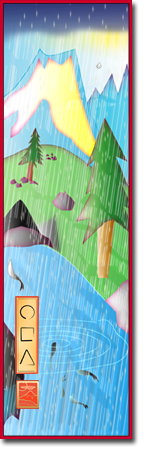On The Way: The Daily Zen Journal
Understanding Mind
Ajahn Chah (1919-1992)

In meditation practice, we work to develop mindfulness so that we will be constantly aware. Working with energy and patience, the mind can become firm. Then whatever sense phenomena we experience, whether agreeable or disagreeable, and whatever mental phenomena such as reactions of gladness or dejection, we will see them clearly. Phenomena are one thing, and the mind is another. They are separate matters.
When something contacts the mind and we are pleased by it, we want to pursue it. When something is displeasing, we want to escape from it. This is not seeing the mind, but running after phenomena. Phenomena are phenomena, mind is mind. We have to separate them and recognize what phenomena are. Then we can be at ease.
When someone speaks harshly to us and we get angry, it means that we are deluded by phenomena and are following after them; the mind is caught by its objects and follows after its moods. Please understand that all these things we experience externally and internally are nothing but deceptions. They are nothing certain or true, and pursuing them, we lose our way. The Buddha wanted us to meditate and see the truth of them, the truth of the world. The world is the phenomena of the six senses; phenomena are the world.
If we don’t understand the Dharma, if we don’t know the mind and don’t know phenomena, then the mind and its objects get mixed together. Then we experience suffering and feel that our minds are suffering. We feel our minds are wandering, uncontrollably experiencing different unhappy conditions, changing into different states.
When we experience the different unhappy states, that is not the mind. Make note of this: when you are experiencing these things in the future, remember, Ajahn Chah said, “This is not the mind.”
We are practicing to reach the mind – the “old” mind. This original mind is unconditioned. In it, there is no good or bad, long or short, black or white. But we are not content to remain with this mind, because we don’t look at and understand things clearly.
Dharma is beyond the habits of the ordinary mind. Before we have trained well, we may mistake wrong for right and right for wrong. So it’s necessary to listen to teaching to gain understanding of Dharma and be able to recognize Dharma in our own mind. Foolishness is in the mind. Intelligence is in the mind. Darkness and delusion exist in the mind. Knowledge and illumination exist in the mind.
It’s like a dirty plate in your home that’s filthy with grime and grease, or a dirty floor. Using soap and water to wash it, you can remove dirt. When the dirt is gone, you have a clean plate or a clean floor. Here, the thing that is soiled is the mind. When we practice correctly, a clean thing is found, just like the dirty floor that is made clean. When the dirt is scrubbed off, the condition of being clean appears. It’s only the dirt that obscures it.
The mind in its natural state, the true mind, is something that is stable and undefiled. It is bright and clean. It becomes obscured and defiled because it meets with sense objects and comes under their influence through liking and disliking. It’s not that the mind is inherently defiled, but that it is not yet established in Dharma, so phenomena can stain it.
The nature of the original mind is unwavering. It is tranquil. We are not tranquil because we are excited over sense objects, and we end up as slaves to the changing mental states that result. So, practice really means searching to find our way back to the original state, the “old thing.” It is finding our old home, the original mind that does not waver and change following various phenomena. It is by nature perfectly peaceful; it is something that is already within us.
Ajahn Chah (1919-1992)
Excerpted from Everything Arises, Everything Falls Away-Teachings on Impermanence and the End of Suffering – translated by Paul Beiter 2005





Each teacher of the Way has their own style to help students break through stubborn attachments and confusion. Each master exemplifies approaches that sometimes are easy to digest and other times pull the rug out from under us. Ajahn Chah has a more gentle and matter-of-fact style using ordinary language and examples that are easy to relate to.
We are practicing to reach the mind – the “old” mind. This original mind is unconditioned.
What does it mean to be “established in the Dharma” or “to recognize Dharma in our own mind?”
When we practice on our own, we must question ourselves and any teaching we hear. If we practice with a teacher or a group, the ability to question becomes even more vital.
Rather than trying to answer any question too quickly, perhaps we should consider allowing the question to percolate and simmer which could reveal a richer depth and authenticity. When the answers come too glibly, it always seems our intellect is attempting to outsmart us, to deprive us of going deeper.
When no teacher or master is around to verify our understanding, who is it that can? Who verified the Buddha’s own enlightenment? What did the Buddha mean with his final words, “Be a lamp unto yourselves?”
Questioning along the way,
Elana, Scribe for Daily Zen